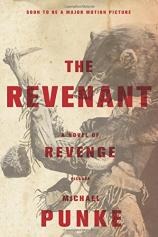Reading Group Guide
Discussion Questions
The Revenant: A Novel of Revenge

1. While Michael Punke was reading a book about the American West, he discovered a snippet about Hugh Glass. Fascinated by Glass’s story, he began to study his life and times, research that would find its way into his novel, THE REVENANT. How does the fact that many of the characters were real historical figures affect your reading? Would the novel have been as compelling if it had been entirely fictional?
2. While we live in much different times than Glass, grizzly bear attacks are not unheard of. If you were in Glass’s position, how would you have reacted? Do you think you would have survived the attack? Is there anything that Glass could have done differently?
3. After the bear attack renders Glass immobile and near death, the Captain asks his brigade for two volunteers to stay behind and tend to Glass until he passes. Bridger agrees to stay to “salve his wounded pride,” and Fitzgerald stays solely for the extra money. Do you think Bridger’s reason to stay is any better than Fitzgerald?
4. Shortly after Glass is abandoned, he has a dream that he is attacked by a rattlesnake. When he wakes, he realizes it was just a dream, and he also discovers that his fever has broken. What could this dream represent?
5. As the novel progresses, Punke provides backstories for some of the central characters, including Glass, via flashback. We learn that Glass was once employed as a freighter captain for Rawsthorne & Sons’. After learning of his father’s death, Glass hops aboard a Spanish merchant ship to return to Philadelphia to tend to family matters. When the ship is captured by pirates, Glass decides that in order to survive he has little choice but to join the pirates. What does this action say about Glass? Even though he was held against his will, should he be considered a criminal?
6. Glass’s mother and finance died while he was held by the pirates, so with no real reason to return to the east, he joins the Rocky Mountain Fur Company on their venture into upper Missouri. Punke writes that Glass “could not explain or articulate his reasons” for joining, and that his reason for joining “was something that he felt more than understood.” What could this mean? What did “The West” represent in America in Glass’s time? How has this representation changed over time?
7. During Glass’s time on the frontier, he is faced with many challenging situations. At several points, he has to do things that most of us living in twenty-first-century North America would find difficult, such as eating rodents and raw meat. Under the same circumstances do you think you would be able to eat rodents and raw meat? Are there any other things that Glass does in order to survive that twenty-first-century North Americans would find especially difficult?
8. Punke uses dreams as a device to gain insight into a character’s subconscious. Bridger has a dream that he is stabbed in the chest by a mysterious specter with the knife he stole from Glass. Who or what could this specter represent? Does Punke want readers to feel empathy for Bridger? If so, why?
9. At Fort Brazeau, Kiowa Brazeau shows Glass a map of Lewis and Clark’s explorations to which Kiowa has contributed details over the past decade. Punke tells us that “the recurrent theme [of the map] was water.” Why were the locations of creeks and other water bodies so important?
10. Kiowa offers Glass a job at the fort, but Glass refuses. Kiowa tells Glass that he finds his quest for revenge to be a “bit of silly venture.” Do you agree? Do you think Glass would have been able to survive the frontier alone without his burning desire for revenge?
11. Glass has a respect for Native Americans that is unusual for a white man of this period. How would you describe Glass’s relationship with the Native Americans? What is it about Glass’s approach and personality that allows for the diplomatic interactions he has with most of the Native Americans he encounters?
12. While on the mission to mend ties with the Arikara, Lengevin, Glass and the rest of the crew are attacked by the Arikara. La Vierge is shot and his brother Dominique refuses to leave him. Glass feels he has no choice but to flee in order to ensure his own survival. Is his decision to leave the wounded behind any different from Fitzgerald’s and Bridger’s decision to leave him? If so, how?
13. When Glass finally manages to find Bridger at Fort Union, he immediately attacks him. However, Bridger does not fight back which compels Glass to end his assault. Why does Glass decide not to kill Bridger? Has Glass forgiven Bridger?
14. At Fort Atkinson Glass finally comes face-to-face with Fitzgerald. Glass, however, is not able to get the revenge he so desperately desires, as Major Constable decides that Fitzgerald will be tried in court. In the seemingly lawless frontier, a trial does seem odd, but is this move toward order and due process a positive and necessary one? Does Fitzgerald’s punishment fit his crime?
15. The novel closes with a conversation between Captain Henry and Bridger. Bridger asks the Captain for permission to join the group of men who are traveling over the Rocky Mountains. The Captain says he is free to go. Why do you think Punke gives the final scene to Bridger rather than Glass?
The Revenant: A Novel of Revenge
- Publication Date: January 6, 2015
- Genres: Fiction, Historical Fiction, Western
- Hardcover: 272 pages
- Publisher: Picador
- ISBN-10: 125006662X
- ISBN-13: 9781250066626








